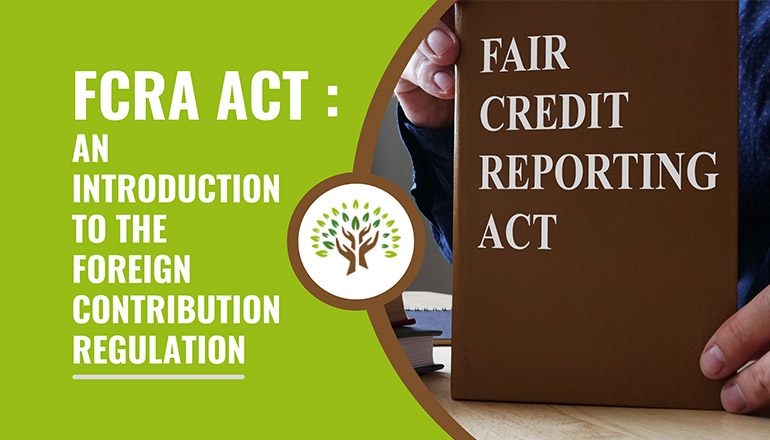By:Sakshi |
Updated on:Jun 30, 2025 |
Category:12a and 80g

The Foreign Contribution Regulation Act (FCRA) is a significant legislation in India that regulates the acceptance and utilization of foreign contributions by individuals, associations, and organizations. Enacted in 1976, the FCRA aims to ensure that such contributions do not compromise the sovereignty and integrity of the nation. This article provides an overview of the FCRA Act, its key provisions, exemptions and exceptions, compliance obligations, recent amendments, and controversies surrounding the act.
The FCRA defines “foreign contribution” as the donation, delivery, or transfer of any currency, security, or article of value made by any foreign source. Its purpose is to regulate the acceptance, utilization, and management of such contributions to prevent any potential adverse effects on the political, economic, and social fabric of India.
The FCRA traces its roots back to the aftermath of India’s independence when the government was concerned about foreign influence on domestic affairs. Over the years, the act has undergone several amendments to strengthen regulatory mechanisms and address emerging challenges.
To receive foreign contributions, organizations in India must meet certain eligibility criteria set by the FCRA Act. These criteria include being in existence for a minimum period, having a defined cultural, social, educational, religious, or economic program, and demonstrating a reasonable administrative track record.
Organizations seeking registration under the FCRA Act must submit an application to the Ministry of Home Affairs (MHA). The application requires detailed information about the organization, including its activities, sources of income, expenditure, and a commitment to adhere to the act’s provisions. Necessary documents such as audited statements, annual reports, and the Memorandum of Association are also required.
Registered organizations must renew their FCRA registration periodically. The FCRA Act also empowers the MHA to cancel the registration of organizations if they are found to be involved in activities contrary to the objectives of the act or fail to comply with reporting requirements.
The FCRA Act defines foreign contributions broadly, covering monetary donations, securities, and even certain types of assets or gifts. It aims to regulate any contribution from a foreign source that could potentially impact India’s political or economic interests.
The act imposes certain prohibitions and restrictions on the acceptance of foreign contributions. It prohibits political parties, government servants, and candidates for election from accepting foreign contributions. Certain categories of organizations, such as those involved in the production and broadcast of news or current affairs programs, are also prohibited from receiving foreign contributions.
Organizations registered under the FCRA Act are required to maintain separate accounts for foreign contributions and submit annual reports providing details of the sources and utilization of such funds. The act emphasizes the transparent and accountable utilization of foreign contributions for the stated objectives of the receiving organization.
The Ministry of Home Affairs plays a crucial role in administering the FCRA Act. It exercises powers to scrutinize and monitor the utilization of foreign contributions, investigate non-compliance,and take necessary actions to ensure compliance with the act’s provisions. The MHA also has the authority to conduct inspections, audits, and inquiries to verify the authenticity and proper utilization of foreign contributions.
The FCRA Act empowers the MHA to initiate investigations and audits to ensure compliance with the act’s provisions. It may appoint officers or agencies to conduct inquiries, summon individuals for questioning, and examine relevant records and documents. These procedures aim to maintain transparency, prevent misuse of foreign contributions, and uphold the integrity of the regulatory framework.
Non-compliance with the FCRA Act can lead to severe penalties and legal consequences. Organizations found guilty of violations may face cancellation of registration, freezing of bank accounts, and even imprisonment of key personnel involved in the management and utilization of foreign contributions. These measures are in place to deter non-compliance and maintain the credibility of the regulatory framework.
Certain government agencies and departments are exempted from the purview of the FCRA Act, given that they are already subject to stringent financial regulations and oversight mechanisms. This exemption acknowledges the accountability and transparency requirements already in place for these entities.
Recognizing the philanthropic and social welfare activities carried out by charitable and religious institutions, the FCRA Act provides exemptions for such organizations. These exemptions are subject to compliance with certain conditions and reporting obligations to ensure the proper utilization of foreign contributions.
The FCRA Act specifies exemptions for certain entities or activities that contribute to India’s national interests, security, or diplomatic relations. These exemptions are granted on a case-by-case basis, and organizations must seek prior permission or clearance to avail themselves of such exemptions.
In times of emergency, such as natural disasters or humanitarian crises, the FCRA Act allows organizations to receive foreign contributions without prior registration. This provision enables swift mobilization of resources to address urgent needs while ensuring accountability and transparency.
Certain activities, such as research, cultural exchange programs, or projects with a direct impact on India’s national interest, require prior permission from the MHA. This ensures that such activities align with the government’s objectives and do not compromise national security or sovereignty.
Register Your FCRA
Organizations registered under the FCRA must maintain proper accounts and records of all foreign contributions received and utilized. They are required to undergo regular audits by qualified professionals to ensure compliance with financial management and reporting standards.
The act mandates organizations to submit annual reports detailing the receipt and utilization of foreign contributions. These reports must adhere to prescribed formats and be submitted within the specified timelines. This reporting mechanism enhances transparency and facilitates monitoring of the utilization of foreign contributions.
Registered organizations are required to publish their annual reports, including financial statements and details of foreign contributions, on their official websites or in any other manner prescribed by the act. This provision aims to promote transparency and allow the public to access relevant information about the utilization of foreign contributions.
Organizations receiving foreign contributions must disclose details of the sources, amounts, and purposes of such contributions in their annual reports. This disclosure requirement enhances accountability and helps prevent any misuse or diversion of foreign funds.
Over the years, the FCRA has witnessed several amendments aimed at strengthening its regulatory framework. These amendments have introduced stricter reporting requirements, increased penalties for non-compliance, and enhanced scrutiny mechanisms to prevent misuse of foreign contributions. The amendments have also sought to align the act with emerging challenges and evolving global standards in the realm of foreign funding.
The FCRA has faced criticisms and controversies regarding its implementation and impact on civil society organizations and advocacy groups. Some stakeholders argue that the act’s provisions are overly stringent and can hinder the legitimate activities of organizations working towards social causes. There have been concerns about the arbitrary cancellation of registrations and the impact on the autonomy and functioning of non-governmental organizations.
The amendments to the FCRA have had a profound impact on civil society organizations and advocacy groups. They have necessitated a greater focus on compliance and reporting obligations, leading to increased administrative burden and resource allocation. Some organizations have had to modify their funding sources and strategies to align with the act’s provisions. The impact of these amendments on the sector is still a subject of debate and discussion.
Referring page-fcraonline.nic.in/
The FCRA continues to evolve in response to emerging challenges and feedback from stakeholders. Future reforms may focus on streamlining the registration process, addressing concerns related to compliance burdens, and enhancing transparency and accountability measures. The aim is to create a regulatory environment that fosters the effective utilization of foreign contributions while upholding the integrity and autonomy of civil society organizations.
Q1. Who is governed by the FCRA Act?
Ans1 The FCRA governs individuals, associations, and organizations that receive foreign contributions in India.
Q2. What are the consequences of non-compliance with the FCRA Act?
Ans2 Non-compliance with the FCRA Act can result in penalties, cancellation of registration, freezing of bank accounts, and even imprisonment, depending on the nature and severity of the violation.
Q3. Are there any exemptions to the FCRA Act?
Ans3. Yes, certain government agencies, charitable and religious institutions, and entities covered by specific exemptions are exempted from the FCRA, subject to compliance with prescribed conditions.
Q4. How are foreign contributions regulated and monitored?
Ans4. The Ministry of Home Affairs plays a crucial role in scrutinizing and monitoring the utilization of foreign contributions. It has the authority to conduct investigations, audits, and inquiries to ensure compliance with the act’s provisions.
Q5. What are the recent amendments to the FCRA Act?
Ans5 Recent amendments to the FCRA have introduced stricter reporting requirements, increased penalties for non-compliance, and enhanced scrutiny mechanisms to prevent misuse of foreign contributions.

I am a dedicated and detail-oriented Website Content Writer with over two years of experience in creating compelling, reader-friendly, and SEO-optimized content. My expertise lies in developing well-structured web pages, landing pages, blogs, and service descriptions that enhance user engagement and drive organic traffic.